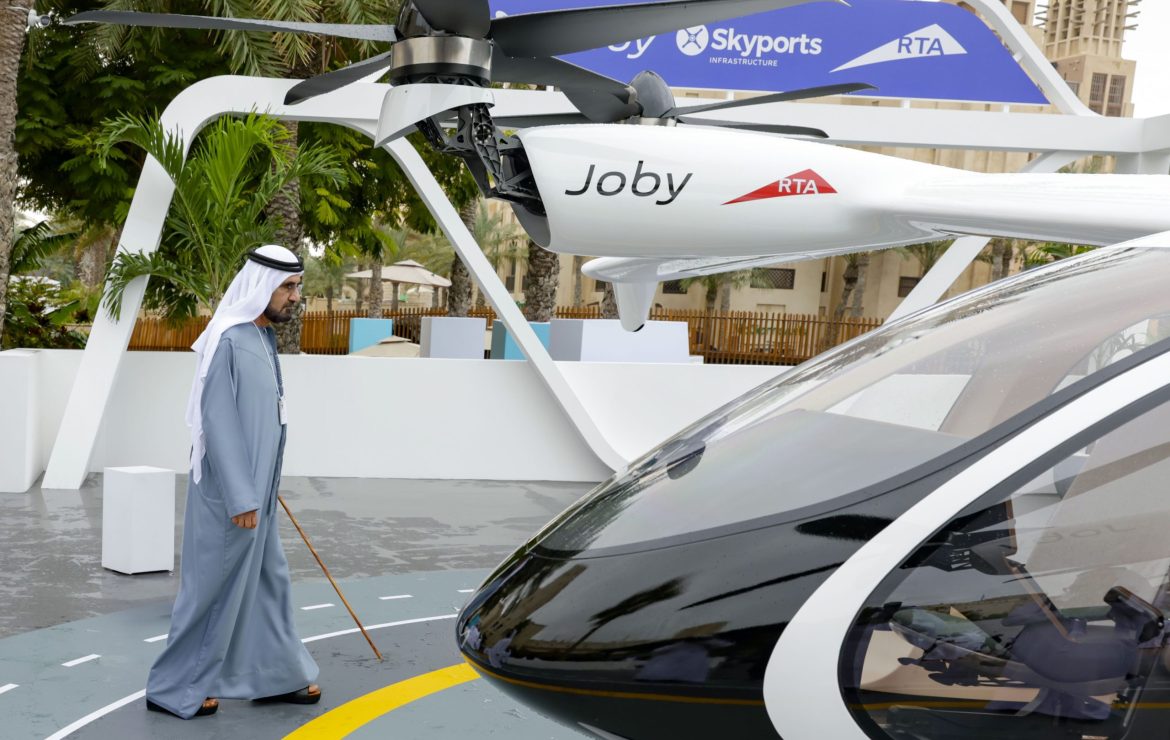With the start of operational trials in Dubai of an air taxi service, which is set for commercial launch in 2026, the UAE is positioning itself globally as a pioneer in the use of smart and sustainable vehicles across various sectors of land, sea and air transportation.
The ground-breaking achievement, once considered a fantasy, became a reality at the World Governments Summit (WGS) 2024, when the Roads and Transport Authority (RTA) in Dubai signed an agreement to launch the air taxi service in Dubai by 2026.
Dubai will become the world’s first city with commercial urban air mobility through electric air taxis, utilising an advanced network of vertical take-off and landing facilities.
The air taxi, named “Joby S4″, can accommodate four passengers and a pilot. It has a flying range of 161 kilometres and can reach speeds of up to 321 kilometres (km) per hour.
The project’s first phase will offer the service in downtown Dubai, Dubai Marina, Palm Jumeirah, and the vicinity of the Dubai International Airport.
In May, Dubai witnessed the trial operation of the first self-driving electric abra, which can carry eight passengers and is manufactured locally. The electric abra is characterised by generating zero carbon emissions, having 30 percent lower operating and maintenance costs, and making no noise compared to diesel-powered abras.
The abra has a maximum speed of seven knots, is equipped with an autonomous control system, and has four lithium batteries that enable it to operate for seven hours.
The UAE has proven its global leadership in land transport by using smart and sustainable vehicles to create a civilised public transport system. The smart mobility project in Yas Island and Saadiyat Island in Abu Dhabi is advancing rapidly. The project involves 17 autonomous vehicles, which have operated under the “TXAI” brand on a network of routes across various locations in the two islands since December 2023 without any traffic accidents.
New self-driving electric buses that look like trams but run on regular roads without a railway began operating in Abu Dhabi in October last year. They are available for service every week on Fridays, Saturdays, and Sundays.
In the same month, the Dubai RTA and Cruise, a self-driving vehicle technology company, conducted a supervised trial of the Chevrolet Bolt, a type of autonomous vehicle, in the Jumeirah 1 area.
Dubai began operating a self-driving vehicle for public transportation in the Sustainable City in Dubailand in September 2018. In April 2019, the Dubai RTA introduced the first self-driving taxi on the streets of Silicon Oasis.
The NAVYA AUTONOM electric self-driving buses passed a pilot test in the University City of Sharjah in October 2020. A self-driving public transport bus that uses artificial intelligence (AI) and the Internet of Things for full automation was developed by Ajman in May 2019. It travels on the emirate’s streets without any human involvement.
Based on indicators of policies, laws, technology, innovation, infrastructure, and consumer confidence, the UAE is among the world’s leading countries in adopting sustainable and smart transportation as a normal part of everyday life.
In July last year, the UAE Cabinet approved the first national preliminary licence for self-driving vehicles on the country’s roads granted to the company WeRide, which will begin testing all types of self-driving vehicles around the country.
The cabinet also approved the national policy for electric vehicles (EVs). A plan to build a complex for smart and self-driving vehicles in Abu Dhabi was approved by the emirate’s Executive Council, which is expected to boost the national economy by AED90 billion to AED120 billion and create 30,000 to 50,000 jobs by 2040.













